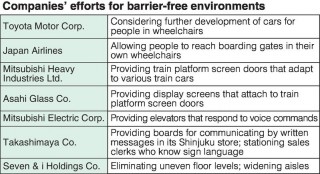Loading
Search
▼ Companies Aim For Barrier-free Society
- Category:Other
Japanese companies are reinforcing their efforts and developing products that can contribute to the realization of a “barrier-free society,” including eliminating uneven surfaces in passageways and improving services at shops, ahead of the 2020 Tokyo Olympic and Paralympic Games.
During the Games a large number of people will visit Japan from abroad. If infrastructure is improved so that disabled and elderly people can use it easily, it will be a good opportunity to demonstrate Japanese technologies for barrier-free environments.
Currently, quite a few companies have been making efforts toward a barrier-free society.
Japan Airlines has made it possible for passengers in wheelchairs to reach boarding gates without getting out of their chairs.
When the Japanese Paralympic delegation departed for Rio de Janeiro to participate in the Games, a large number of them were able to board planes without any inconvenience.
Mitsubishi Electric Corp. has installed custom-made elevators with a function that allows visually impaired people and those with other disabilities to choose the floor they want with their voice.
Convenience store chains have been renovating their stores so that uneven surfaces at entrances and in lavatories are minimized and wheelchair users can enter easily.
Prof. Satoshi Fukushima of the University of Tokyo, an expert on barrier-free affairs, pointed out that problems remain by citing elevators at train stations where people have to transfer from one place to another multiple times to move between the levels of a single station.
“There are many facilities in which elevators were installed to fulfill an obligation. From users’ viewpoints, they are insufficient,” he said.
Ahead of 2020, the government aims to make further progress toward a barrier-free society so that Japan will be able to demonstrate its advancements to the rest of the world.
The Rio de Janeiro Paralympic Games, in which many Japanese athletes made remarkable achievements, stimulated interest in barrier-free environments and boosted such companies’ efforts.
Concerning platform screen doors to prevent visually impaired people from falling onto the tracks at train stations, a subsidiary of Mitsubishi
Heavy Industries Ltd. is developing a new model that can sense the position of train doors and adjust the platform screen doors to open at the appropriate place. This is because the positions of doors on trains vary among models.
Asahi Glass Co. and other firms have begun a trial to alert hearing-impaired people with messages such as, “Rushing onto the train is dangerous,” with digital displays attached to platform screen doors.
Toyota Motor Corp. is also considering the further development of cars that wheelchair users can get into without getting out of their wheelchairs.
During the Games a large number of people will visit Japan from abroad. If infrastructure is improved so that disabled and elderly people can use it easily, it will be a good opportunity to demonstrate Japanese technologies for barrier-free environments.
Currently, quite a few companies have been making efforts toward a barrier-free society.
Japan Airlines has made it possible for passengers in wheelchairs to reach boarding gates without getting out of their chairs.
When the Japanese Paralympic delegation departed for Rio de Janeiro to participate in the Games, a large number of them were able to board planes without any inconvenience.
Mitsubishi Electric Corp. has installed custom-made elevators with a function that allows visually impaired people and those with other disabilities to choose the floor they want with their voice.
Convenience store chains have been renovating their stores so that uneven surfaces at entrances and in lavatories are minimized and wheelchair users can enter easily.
Prof. Satoshi Fukushima of the University of Tokyo, an expert on barrier-free affairs, pointed out that problems remain by citing elevators at train stations where people have to transfer from one place to another multiple times to move between the levels of a single station.
“There are many facilities in which elevators were installed to fulfill an obligation. From users’ viewpoints, they are insufficient,” he said.
Ahead of 2020, the government aims to make further progress toward a barrier-free society so that Japan will be able to demonstrate its advancements to the rest of the world.
The Rio de Janeiro Paralympic Games, in which many Japanese athletes made remarkable achievements, stimulated interest in barrier-free environments and boosted such companies’ efforts.
Concerning platform screen doors to prevent visually impaired people from falling onto the tracks at train stations, a subsidiary of Mitsubishi
Heavy Industries Ltd. is developing a new model that can sense the position of train doors and adjust the platform screen doors to open at the appropriate place. This is because the positions of doors on trains vary among models.
Asahi Glass Co. and other firms have begun a trial to alert hearing-impaired people with messages such as, “Rushing onto the train is dangerous,” with digital displays attached to platform screen doors.
Toyota Motor Corp. is also considering the further development of cars that wheelchair users can get into without getting out of their wheelchairs.
- September 26, 2016
- Comment (0)
- Trackback(0)


